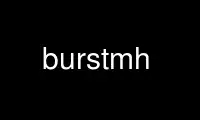
This is the command burstmh that can be run in the OnWorks free hosting provider using one of our multiple free online workstations such as Ubuntu Online, Fedora Online, Windows online emulator or MAC OS online emulator
PROGRAM:
NAME
burst - explode digests into messages
SYNOPSIS
burst [+folder] [msgs] [-inplace | -noinplace] [-mime | -nomime] [-automime] [-quiet |
-noquiet] [-verbose | -noverbose] [-version] [-help]
DESCRIPTION
Burst considers the specified messages in the named folder to be Internet digests, and
explodes them in that folder.
If -inplace is given, each digest is replaced by the “table of contents” for the digest
(the original digest is removed). Burst then renumbers all of the messages following the
digest in the folder to make room for each of the messages contained within the digest.
These messages are placed immediately after the digest.
If -noinplace is given, each digest is preserved, no table of contents is produced, and
the messages contained within the digest are placed at the end of the folder. Other
messages are not tampered with in any way.
If -automime is given, burst will try to determine if the message is formatted with MIME
and contains MIME parts of type “message/rfc822”. If it does, it will burst the message
using MIME formatting rules. The -mime switch can be used to enforce the use of MIME
formatting. The -nomime switch will force burst to use RFC 934 rules.
The -quiet switch directs burst to be silent about reporting messages that are not in
digest format.
The -verbose switch directs burst to tell the user the general actions that it is taking
to explode the digest.
It turns out that burst works equally well on forwarded messages and blind-carbon-copies
as on Internet digests, provided that the former two were generated by forw or send.
Use burstmh online using onworks.net services